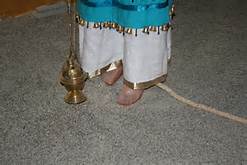THE LIVES OF THE PATRIARCHS #169 | THE LIFE OF MOSES #150
Pastor Christopher Choo
Lesson 3855
THE LIVES OF THE PATRIARCHS #169
THE LIFE OF MOSES #150
MOSES AT MT.SINAI #49
THE TABERNACLE OF MOSES ( Part 8 )
Did the high priest have a rope tied to him when he entered the Holy of Holies?
This question is always posed in every teaching on the High Priest in the Holy of Holies.
There is a tradition that the High Priest of Israel would enter the Holy of Holies in the tabernacle or temple with a rope tied to his foot and/or with bells around his waist.
Traditional teaching says that when the High Priest went into the Holy of Holies on Yom Kippur during the last couple of centuries of the temple, a scarlet rope was tied to his foot. A priest in the Holy Place tended the other end of this rope, which had a purpose. If the high priest’s sins were not atoned for properly, he would die in the presence of the Shekinah—the glory of God—that filled the Holy of Holies.
Since nobody else could enter that part of the temple without also dying, the priests felt they needed a way to retrieve the body of the High Priest, if necessary. That was the purpose of the rope—to pull the body out. The bells jingling would be the sign that the priest had fallen to the ground dead.
If this tradition is true, it would be a powerful reminder of God’s holiness and how we should praise Jesus for the direct access to God’s throne He provides!
However, the Bible does not record such a practice.
In fact, the Bible has specific instructions regarding what the High Priest can and cannot wear (Exodus chapters 28-35).
It seems highly unlikely that God would allow this practice.
This would mean that one who dared to enter God's presence without the fear of the Lord entered at His peril.
In 2 Chronicles 26:16 King Uzziah tried to usurp the Aaronic priesthood's role by entering the Holy Place of the Temple at Jerusalem to burn incense.
Let us carefully read what happened.
"But when he was strong, he grew proud, to his destruction. For he was unfaithful to the Lord his God and entered the temple of the Lord to burn incense on the altar of incense. But Azariah the priest went in after him, with eighty priests of the Lord who were men of valor, and they withstood King Uzziah and said to him, “It is not for you, Uzziah, to burn incense to the Lord, but for the priests, the sons of Aaron, who are consecrated to burn incense. Go out of the sanctuary, for you have done wrong, and it will bring you no honor from the Lord God.” Then Uzziah was angry. Now he had a censer in his hand to burn incense, and when he became angry with the priests, leprosy broke out on his forehead in the presence of the priests in the house of the Lord, by the altar of incense. And Azariah the chief priest and all the priests looked at him, and behold, he was leprous in his forehead! And they rushed him out quickly, and he himself hurried to go out because the Lord had struck him. And King Uzziah was a leper to the day of his death, and being a leper lived in a separate house, for he was excluded from the house of the Lord. And Jotham his son was over the king’s household, governing the people of the land.”
He was at the top of his game as a king. He had great power. His enemies feared him. He had achieved great things for Judah, and at some point, he forgot that it was the Lord’s doing, not his. His pride swelled and he forgot the Lord, and Uzziah fell away.
This was Moses’ warning to the children of Israel in Deuteronomy 8, and it’s a timeless warning to God’s people to this very day. Nothing, nothing has changed. Pride comes before a fall.
Let us hope for the legacy of King David that is summed up in Acts 13:36: “For David, after he’d served the purpose of God in his own generation, fell asleep.”





